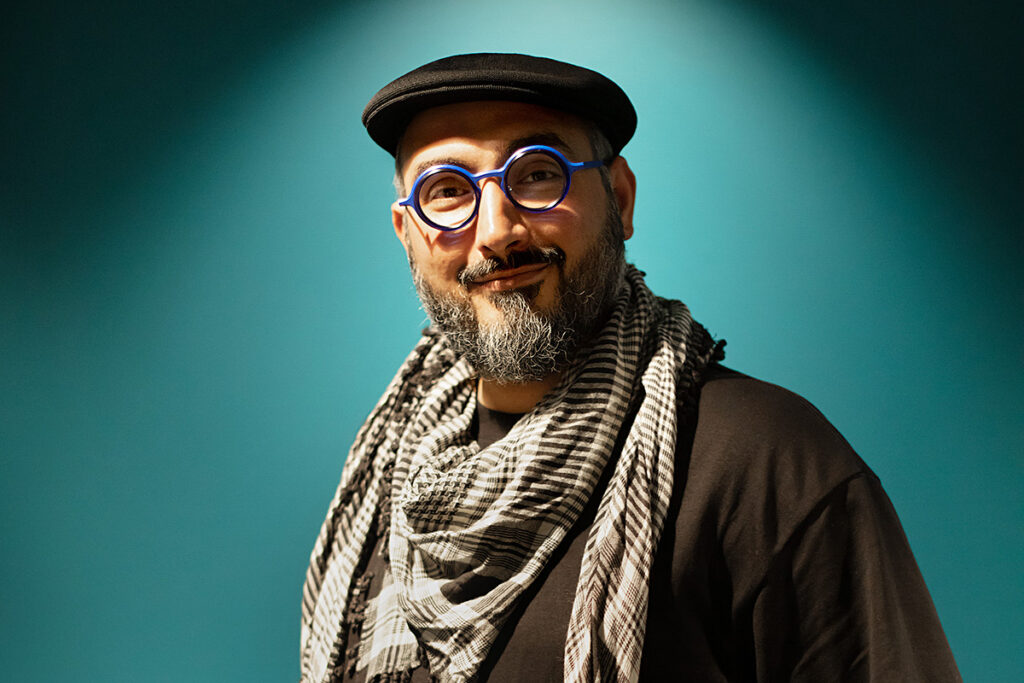There is no question whether Younes Saramifar is an activist scientist. His engagement for social change has been the sole reason why he pursued an academic career. For him there is no other way: “As a scientist and a university teacher, one should reflect critically on society and teach students to do the same”, he says.
Saramifar teaches at the Faculty of Humanities and at Amsterdam University College. His courses are critical on the role of the Western hegemony in past and present and its consequences on inequality today, both on a global scale and on everyday interactions. As a researcher, Saramifar studies Islamist armed groups, like Hezbollah in Lebanon.
Objectivity is a hoax
Academia cannot exist without activism, Saramifar believes. Scientific objectivity –often claimed by scholars who do not want to take a political stance – is a hoax, in his view, that supports the existing social order.
“The focus on objectivity in research is typical for the Global North: Western Europeans being delusional with the false idea of modernity. They depoliticize knowledge, remove emotions, suppress less-represented views and censor critical voices”, Saramifar says, “being so called objective means taking the existing social order for granted and I am not willing to do that.”
The attachment to objectivity is rooted in (reformed) Calvinist Protestantism, Saramifar states. “It’s connected to a general attitude that values order, routine, regularity, and obedience”, he goes on. “At VU this is even stronger, due to the emotional attachment to the Faculty of Religion and Theology, and the institutional insecurity over students’ numbers.”
Coming from an Iranian Muslim background, Saramifar advocates for a broader perspective to academic discussions on questions like why there is so much violence in the Middle East. His critical approach got him into trouble more than once.
In 2021, he expressed concerns about a drawing used in a campaign to attract more students to the anthropology department. In this drawing, a white girl was seen holding the earth in her hands. Saramifar saw this as a sign of White supremacy and signaling exclusion and inferiority of non-Europeans. His colleagues couldn’t appreciate his viewpoint, and their hostility was one of the reasons why he moved from the Faculty of Social Sciences to the Faculty of Humanities.
Trigger warning
At the beginning of 2024, Saramifar was reproached for a trigger warning in his course description, stating that he considers Israel an apartheid state and that the wealth of most European states is built upon colonialism and oppression. The text had been part of the course manual for four years. Saramifar wanted to be transparent with his students.
VU management claimed there was an anonymous complaint and Saramifar was pushed to remove his statement. He adapted his course description into a more academic formulation, but will continue to teach from the perspective of the underrepresented, all the while still engaged in discussions with VU with help of his lawyer. Meanwhile, he became more and more isolated as a researcher. Saramifar has the impression he is cancelled.
Too hot to handle
Universities should be environments in which the status quo can be challenged, but that’s not the way it is, Saramifar experienced. “If your activism doesn’t support the brand image of the university, it is considered a problem. The VU is advertising with the slogan ‘a broader mind’ but I have not yet met a truly broad mind amongst university board members.”
Universities like VU have no problem with activism in general, but it depends on who says what and how, Saramifar analyses. “When I say certain things as a non-white, male Muslim, it gets fishy soon. If I criticize White academia and White feminists for example on misusing gender inequality, I am easily framed as the angry Muslim man.”
Saramifar also experiences that activism is only accepted if it’s done by politely asking for reform instead of questioning the system and demanding structural change. And demanding change in the academic world itself is a twofold bad idea for a researcher, Saramifar experienced. “I have become too hot to handle”, he says. “Some colleagues consider me a risk. Their perception impacts my career, which guarantees my residence permit. I still don’t have the Dutch citizenship.”
Not critical enough
This doesn’t mean Saramifar lets himself be silenced though. He still debates the state of the world from a non-Western viewpoint, and supports minority students struggling with exclusion. He insisted his new course be named ‘The Middle East in contemporary history’, instead of ‘Contemporary history of the Middle East’. “As if the history of the Middle East can be studied separately and isn’t connected to the historical context of the rest of the world.”
Meanwhile, students are increasingly vocal about new perspectives. Saramifar usually gets positive student evaluations for his courses thanks to his encouragement of activism and critical thinking. “Some Amsterdam University College students explained in a survey that they don’t choose some of VU’s master’s programs because VU is not critical enough”, he says.
Saramifar is pessimistic about his own chances in the academic world: “I don’t know any example of uncompromising activists from outside Europe who have become a professor in the Netherlands.”
In the other interviews with activist scientists, theologian Katja Tolstoj talks about taking Ukrainian refugees into her home and social scientist Tamara Soukotta shares how VU suspended her after teaching her course in a decolonized manner.
